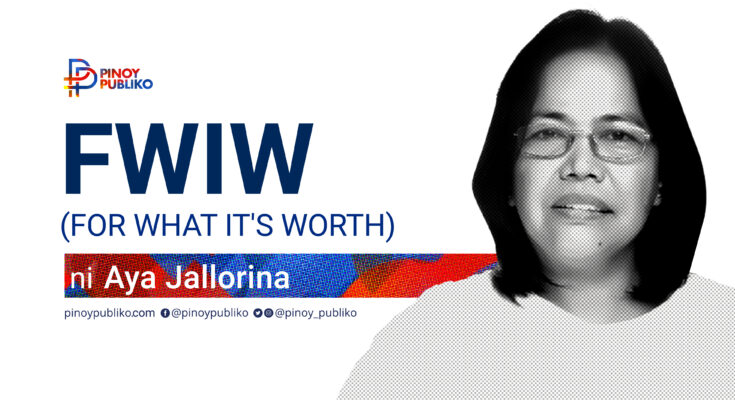“DM or PM” is the key.
Alam ba ninyo na bawal ito sa ilalim ng Price Tag Law? Dapat ay nakalagay na sa mismong produkto ang presyo. Ang tawag dito ay price transparency.
Bawal na hindi maglagay ng presyo sa ibinibentang produketo dahil misleading o mapanlinlang ito sa online consumers. Kung susuriin ang mga online business na nag-aalok ng mga paninda, maraming paglabag na ginagawa katulad na lang sa price transparency. Kaya naman naisip kong balikan ang isyu na ito.
Madalas akong mag-window shopping online. Not intentionally though kasi given pag nagso-socmed ka na maka-engkuwentro ng samu’t saring patalastas ng online businesses. At minsan, nauuwi sa bilihan o pagma-mine.
Pero may alam akong kaibigan na naging addict na sa pagma-mine online. At ilang beses na ring na-scam. Minsan ay nag-order siya ng baby clothes worth P2,500. Kakapanganak niya noon. Parang 10-15 items yun at ang presyo ay P2,500 lamang lalo na at branded pa diumano. Ang policy ng seller ay payment bago delivery. No COD (cash on delivery). Excited na nag-comply ang aking kaibigan. Naghintay ng delivery. Noong una ay sumasagot sa text niya yung “seller”. Nagbigay ng timeframe ng delivery.
Pero lumipas ang maghapon at walang delivery na naganap. Next day, in-accessible na ang number na binigay ng “seller”. Kahit ilang beses na tinangkang tawagan, di na ito makontak. Naglahong parang bula pati ang ibinayad na P2,500.
I asked her kung di na siya nag o-online purchase dahil sa pangyayari. At ang sagot niya ay tuloy pa rin daw. Pero mas maingat na siya.
Marami naman talagang ganansiya ang online transactions. Hindi mo kailangang mapagod sa pisikal dahil idideliver na sa mismong bahay mo o opisina ang produkto. Smooth din sa bayaran. Basta may online money app ka gaya ng GCash, Maya o Grabpay. Puwede rin ang credit card.
Noong panahon ng Covid, ang sigla ng online market. Masigasig ang mga tao na pakinabangan ang teknolohiya sa pang araw-araw nilang buhay.
Medyo mas relaxed na tayo ngayon sa restrictions subalit tuloy-tuloy na masigla ang kalakalan online. Hindi rin maikakaila ang pagyabong ng negosyo ng mga online sellers.
Alam ng maraming ahensiya ng gobyerno gaya ng Department of Trade and Industry (DTI), National Privacy Commission (NPC) at Intellectual Property Office of the Philippines (IPOPHL) na dapat mapangalagaan ang karapatan ng mga konsyumer na tumatangkilik sa mga produktong online. Kaya naman kasama ang ibang ahensiya ng gobyerno ay may inisyu silang Joint Administrative Order No. 22-01 na may titulong, “Guidelines for Online Businesses Reiterating The Laws and Regulations Applicable To Online Businesses and Consumers.”
Ipinapaalala ng naturang kautusan sa mga online businesses ang responsibilidad na patatagin ang lubos na pagtitiwala ng publiko sa e-commerce at itaguyod ang proteksyon sa interes ng konsyumers sa pamamagitan ng pagtalima sa mga kautusan sa ilalim ng batas ng Pilipinas.
Sa naturang JAO 22-01, nakapaloob ang mga pananagutan ng online businesses, e-commerce platforms at e-marketplaces gayundin ang tungkulin ng mga ahensiya ng gobyerno para sa remedyo na pupuwedeng gamitin ng mga may reklamong mamimili,
Narito ang key points ng JAO 2022-01:
• Applicable laws — The laws applicable to physical or offline businesses are, as far as practicable, equally applicable to online businesses.
• Product information — Online businesses must provide easily accessible, complete, and correct information about their goods and services, and adhere to fair advertising and marketing practices. This includes information about the products’ quality, style, shape, size, color, condition (new, unused, repackaged, second-hand), quantity or availability, truthful price advantage (discounts), authorized trademark, authenticity, etc.
• Price transparency — Online businesses must ensure transparency and openness regarding prices, including any additional costs, such as customs duties, currency conversion, shipping, delivery, taxes, service/processing fees, and convenience fees.
• Price tag placement — product listings by e-retailers or merchants on marketplaces/platforms must contain the price(s) of the products/services in pesos and must display payment policies, delivery options, returns, refunds and exchange policy, and other charges, if applicable. The total price must be clear, updated and accurate to avoid misleading online consumers. The “DM is key” practice, requiring the customer to direct-message before a price is given, is considered a violation of the Price Tag Law.
• Data Privacy — Personal information collected by online sellers, merchants or e-retailers may be obtained and retained only for legitimate purposes. All personal information must be secured with reasonable and appropriate security measures to guard against use for purposes other than what the consumer has consented to.
• Defective products and services — Under Republic Act No. 7934 or the Consumer Act of the Philippines, online sellers, like other tradesmen, bear the liability of the manufacturer, producer, and any importer of the defective products when (a) it is not possible to identify or there is no clear identification of the manufacturer, builder, producer or importer of the product supplied; or (b) the online sellers do not adequately preserve perishable goods.
• Regulated or prohibited products — For regulated goods, online businesses must exhibit the corresponding license or permit number as prescribed by the applicable government agencies. On the other hand, online sellers may in no case be allowed to sell or distribute goods and services specifically prohibited by law.
• Review and cancellation options — Online businesses must offer options to allow consumers to review their transactions prior to final purchase and to cancel or withdraw from confirmed transactions in appropriate circumstances. I would like to emphasize the words “in appropriate circumstances” as bogus buyers (buyers who don’t pay for their purchases) and joy reservers (buyers who keep on reserving items but will not actually buy it) are also not tolerated by the law. Under the JAO, fraudulent acts both by online businesses and consumers are to be dealt with in accordance with existing penal/special laws.
• Non-proliferation of fake online reviews — online businesses may neither restrict the ability of consumers to make critical or negative reviews of goods or services, nor spread wrong information about competitors.
• Consumer complaints — DTI implements a “No Wrong Door Policy,” which means that any consumer complaint filed with the DTI, whether the subject matter falls under its jurisdiction, is to be accepted for appropriate assistance, subject to the limitations imposed by law. Online consumers may file complaints with the DTI via walk-in, consumer care hotlines, and written complaints. However, the consumer may opt to seek resolution with the online business first before resorting to intervention by the DTI or any other regulatory agency.
• Electronic messages as court evidence — Communications of online sellers, merchants, e-retailers, and consumers, whether done via social media, e-commerce platforms, or any other form of electronic communications using an electronic device, qualify as electronic data messages. Screenshots of such electronic communications may be used as evidence to prove a fact or establish a right in administrative or judicial proceedings, subject to rules issued by the Supreme Court.
Ang regulasyon ng gobyerno sa online businesses ay hindi sapat kung mismong online buyer ay hindi mag-iingat sa kanyang online transactions. Matagal-tagal na rin akong online buyer ng sapatos, pagkain at mga gamit sa kusina. Ilan sa mga ginagawa ko bago ko isara ang transaksiyon ay ang pagpili ng opsyon na Cash on Delivery (COD).
Mas ligtas ito sa lahat ng transaksiyon. Siyempre binabasa ko rin muna ang comments at recommendations ng ibang buyers bago ituloy. Red flag agad kapag mas maraming negative comments. Sa online purchase ng pagkain, pinipili kong dumiretso sa kilalang app na GrabPay dahil mabilis silang mag refund kung failed ang transaksiyon o nakansel o hindi kinayang maideliver. Never kong ginamit ang aking credit card sa online purchases dahil masyadong risky.
Tulungan at kooperasyon ng mamimili, nagtitinda at regulatory agencies ang kailangan upang maging katiwa-tiwala ang e-commerce.
Para sa reaksyon o komento at tanong mag-email sa [email protected]





